- Home
- Jojo Moyes
Honeymoon in Paris: A Novella
Honeymoon in Paris: A Novella Read online
JOJO MOYES
Honeymoon in Paris
PENGUIN BOOKS
Contents
Chapter One
Chapter Two
Chapter Three
Chapter Four
Chapter Five
Chapter Six
Chapter Seven
Read More
Chapter One
Paris, 2002
Liv Halston holds tight to the guard rail of the Eiffel Tower, looks down through the diamond-strung wire at the whole of Paris laid out below, and wonders if anyone, ever, has had a honeymoon as disastrous as this one.
Around her, families of tourists squeal and duck back from the view, or lean against the mesh theatrically for their friends to take pictures, while an impassive security guard looks on. From the west a glowering clump of storm clouds is moving towards them across the sky. A brisk wind has turned her ears pink.
Someone throws a paper aeroplane, and she watches it travel its corkscrew course down, buoyed by passing winds, until it grows too small and is lost from view. Somewhere down there, among the elegant Haussmann boulevards, and the tiny courtyards, the classically laid-out parks and the gently undulating banks of the Seine, is her new husband. The husband who had informed her, two days into their honeymoon, that he was really sorry but he was going to have to meet someone that morning for a work thing. The building he had been telling her about on the edge of the city. Just for an hour. He shouldn’t be long. She’d be okay, wouldn’t she?
The same husband she had told that if he walked out of the hotel room he could bugger right off and not come back.
David had thought she was joking. She had thought he was. He’d half laughed. ‘Liv – this is important.’
‘As is our honeymoon,’ she had replied. The way they had stared at each other then, as if they were each facing someone they had never seen before.
‘Oh, my. I think I’m gonna have to go back down.’ An American woman, with a huge money-belt around her waist and hair the colour of gingerbread, pulls a face as she inches past. ‘I can’t do heights. You feel it creaking?’
‘I hadn’t noticed,’ Liv says.
‘My husband’s like you. Cool as a cucumber. He could stand there all day. My nerves were shot coming up in that darned lift.’ She looks at a bearded man, who is taking pictures intently with an expensive camera, shivers and makes her way towards the lift, holding on to the rail.
It is painted brown, the Eiffel Tower, the same shade as chocolate, an odd colour for such a delicate-looking structure. She half turns to say as much to David before realizing that, of course, he isn’t there. She had pictured herself and David up here from the moment he suggested a week in Paris. The two of them, their arms wrapped around each other, perhaps at night, looking down at the City of Lights. She would be giddy with happiness. He would look at her the way he had when he proposed. She would feel like the luckiest woman in the world.
Then a week had become five days, because of an unmissable meeting in London on the Friday. And of those five days, only two had passed before another apparently unmissable meeting had popped up.
And now Liv stands, shivering ‒ in the summer dress she had bought because it was the exact shade of her eyes and she’d thought he would notice ‒ as the skies grow grey and a fine spit starts. And she wonders whether her schoolgirl French is up to hailing a taxi back to the hotel, or whether, in her current mood, she may as well trudge home in the rain. She joins the queue for the lift.
‘Are you leaving yours up here too?’
‘My what?’
The American woman is beside her. She smiles, nods towards Liv’s shiny wedding band. ‘Your husband.’
‘He – he’s not here. He’s … busy today.’
‘Oh, are you here on business? How gorgeous for you. He gets to do the work, and you get to have a lovely time seeing the sights.’ She laughs. ‘You worked that out right, honey.’
Liv takes a last look out at the Champs-Élysées and something settles in the pit of her stomach. ‘Yes,’ she says. ‘Aren’t I the lucky one?’
‘Marry in haste …’ her friends had warned her. They had said it jokingly but, given that she and David had known each other for all of three months and eleven days when he’d proposed, she could detect the faint edge of truth in it.
She hadn’t wanted a big wedding: her mother’s absence would have hung over it, colouring it a darker shade. So she and David had fled to Italy, to Rome, where she’d bought a white dress off the peg from an understated and terrifyingly expensive designer in the via Condotti and had understood almost none of the church ceremony until David slid a ring onto her finger.
David’s friend Carlo, who had helped organize it and acted as one of their witnesses, had kidded her afterwards that she had just agreed to honour, obey, and accept any further wives that David might wish to add to the collection. She had laughed for a solid twenty-four hours.
She had known it was right. She had known it from the moment she’d met him. She’d known it even when her father had looked downcast at the news, and masked it immediately with hearty congratulations, and she had realized guiltily that, while she had never particularly dreamt about her wedding, her surviving parent might have done. She’d known it when she’d moved her few belongings to David’s house – the glass structure on top of a sugar factory by the Thames had been one of the first things he’d designed and built. Every morning in the six weeks between her wedding and her honeymoon she had woken up in the Glass House, surrounded by sky, gazed at her sleeping husband and known that they were right together. Some passions were too great not to act upon.
‘Don’t you feel … I don’t know … a bit young?’ Jasmine had been waxing her legs over her kitchen sink. Liv had sat at the table and watched her, smoking a contraband cigarette. David didn’t like smoking. She had told him she’d stopped a year ago. ‘I mean, I’m not being funny, Liv, but you do tend to do things on impulse. Like the whole cutting-your-hair-off-for-a-bet thing. And the jacking-in-your-job-and-going-round-the-world thing.’
‘Like I’m the only person ever to do that.’
‘You’re the only person I know who did the two things on the same day. I don’t know, Liv. It just … it all seems so fast.’
‘But it feels right. We’re so happy together. And I can’t imagine him doing anything that makes me angry or sad. He’s …’ Liv blew a smoke ring towards the strip light ‘… perfect.’
‘Well, he’s definitely lovely. I just can’t believe you of all people are getting married. You were the one of us who always swore you wouldn’t.’
‘I know.’
Jasmine pulled up a sheet of wax and grimaced at its grim residue. ‘Ouch. Fuck, that hurt … He’s bloody fit, though. And that house sounds amazing. Better than this hole.’
‘When I wake up with him I feel like I’m in the pages of some glossy magazine. Everything is just so grown-up. I didn’t bother bringing hardly any of my stuff. He has linen bed sheets, for God’s sake. Actual linen sheets.’ She blew another smoke ring. ‘Made of linen.’
‘Yeah. And who’s going to end up ironing those linen sheets?’
‘Not me. He has a cleaner. He says he doesn’t need me to do that stuff. He’s worked out I’m a rubbish housekeeper. In fact, he wants me to think about doing a postgrad.’
‘A postgrad?’
‘He says I’m too smart not to do something with my life.’
‘Shows how long he’s known you.’ Jasmine rotated her ankle, looking for stray hairs. ‘So. Are you going to?’
‘I don’t know. There’s so much going on, what with moving into his house and getting married and everything. I feel like I should get my head
round being married first.’
‘A wife.’ Jasmine grinned at her slyly. ‘Oh, my God. Wifey.’
‘Don’t. It still freaks me out a bit.’
‘Wifey.’
‘Stop it!’
So, obviously, Jasmine had kept saying it until Liv flicked her hard with a tea-towel.
He’s at the hotel when she returns. She had decided to walk, and the heavens had opened, so she’s soaked through, her dress clinging to her wet legs. As she walks through Reception she swears the concierge gives her the look reserved for the kind of woman whose husband takes business meetings on their honeymoon.
David is on the telephone when she walks into their room. He turns, spies her, and breaks the call. ‘Where have you been? I was getting worried.’
She pulls her wet cardigan from her shoulders, reaches into the wardrobe for a hanger. ‘I went up the Eiffel Tower. And walked back.’
‘You’re soaked. I’ll run you a bath.’
‘I don’t want a bath.’ She does. She’s thought of nothing else the whole, long, miserable walk back.
‘I’ll order up some tea, then.’
As he picks up the phone for room service she turns away, walks into the bathroom and shuts the door. She can feel David looking after her long after it has closed. She doesn’t know why she’s being mulish. She’d planned to be nice when she got back, to recover the day. It was only one meeting after all. And she had known what he was like, from their very first date, when he had driven her around London and told her about the background and design of modern glass and steel structures they passed.
But something had happened as she’d crossed the threshold of the hotel room. She’d seen him on the telephone and just the simple fact that she’d known, immediately, it was a work call had skewed her fragile sense of goodwill. You weren’t worried about me, she thinks crossly. You were discussing what thickness of glass to use on the new building entrance, or whether the roof brace could support the weight of the extra ventilation shaft.
She runs a bath, filling it with expensive hotel bubbles, then slides in, letting out a sigh of relief as she immerses herself in the hot water.
Some minutes later, David knocks on the door and enters.
‘Tea,’ he says, and puts the cup on the side of the marble bath.
‘Thank you.’
She waits for him to leave, but he sits down on the closed lid of the lavatory, leaning forwards, and watches her.
‘I booked us a table at La Coupole.’
‘For tonight?’ ‘Yes. I told you about it. It’s the brasserie with the amazing murals painted by artists who –’
‘David, I’m really tired. I walked a long way. I don’t think I want to go out tonight.’ She doesn’t look at him as she speaks.
‘I’m not sure I’ll be able to get us reservations for another night.’
‘Sorry. I just want to have some room service and go to bed.’
Why are you doing this? she yells at herself silently. Why are you sabotaging your own honeymoon?
‘Look. I’m sorry about today, okay? It’s just that I’ve been trying to get a meeting with the Goldsteins for months. And it just turns out they’re in Paris, and they finally agreed to see my designs. This is the building I was telling you about, Liv. The big one. And I think they liked it.’
Liv stares at her toes, which emerge pink and shining from the water. ‘Well, I’m glad it went well.’
They sit in silence.
‘I hate this. I hate that you’re so unhappy.’
She looks up at him, his blue eyes, the way his hair is always a bit messy, the way he is resting his face in his hands. After a moment’s hesitation she reaches out a hand, and he takes it. ‘Ignore me. I’m being silly. You’re right. I know this building’s a big deal for you.’
‘It really is, Liv. I wouldn’t have left you for anything else. This is the thing I’ve been working towards for months. Years. If I can pull it off, the partnership is made. My reputation is made.’
‘I know. Look, don’t cancel dinner. We’ll go. I’ll feel better after my bath. And we can plan our day tomorrow.’
His fingers close around hers. Because of the soapsuds it’s hard for hers not to slip away.
‘Well … here’s the thing. They want me to meet their project manager tomorrow.’
Liv goes very still. ‘What?’
‘They’re flying him over specially. They want me to meet them at their suite in the Royal Monceaux. I thought maybe you could go to the spa there while I was with them. It’s meant to be amazing.’
She looks up at him. ‘Are you serious?’
‘I am. I heard it was voted French Vogue’s best –’
‘I’m not talking about the bloody spa.’
‘Liv – this means they’re actually keen. I have to capitalize on it.’
Her voice, when it emerges, is strangely strangulated. ‘Five days. Our honeymoon is all of five days, David. Not even a week. You’re telling me they couldn’t wait to have a meeting for another seventy-two hours?’
‘This is the Goldsteins, Liv. This is how billionaires do things. You have to fit around their timetable.’
She stares at her feet, at the pedicure she had booked at great expense, and remembers how she and the beautician had laughed when she’d said that her feet looked good enough to eat.
‘Please go away, David.’
‘Liv. I –’
‘Just leave me alone.’
She doesn’t look at him as he rises from the lavatory. When he closes the bathroom door behind him, Liv shuts her eyes and slides under the hot water until she can hear nothing at all.
Chapter Two
Paris, 1912
‘Not the Bar Tripoli.’
‘Yes, the Bar Tripoli.’
For a big man, Édouard Lefèvre could bear an uncanny resemblance to a small boy informed of some imminent punishment. He looked down at me, his expression pained, and blew out his cheeks. ‘Ah – let’s not do this tonight, Sophie. Let’s go and eat somewhere. Let’s have an evening free of financial concerns. We’re only just married! It’s still our lune de miel!’ He waved dismissively at the bar.
I reached into my coat pocket for the handful of IOUs I had folded in there. ‘My beloved husband, we cannot have an evening free of financial concerns for we have no money to eat. Not a centime.’
‘But the money from the Galerie Duchamps –’
‘Gone on rent. You were behind from the summer, remember.’
‘The savings in the pot?’
‘Spent two days ago when you were minded to treat everyone in Ma Bourgogne to breakfast.’
‘It was a wedding breakfast! I felt the need to mark the occasion of our return to Paris somehow.’ He thought for a moment. ‘The money in my blue pantalons?’
‘Last night.’
He patted his pockets, coming up only with his tobacco pouch. He looked so downcast I almost laughed.
‘Courage, Édouard. It won’t be so bad. If you prefer I’ll go in and ask your friends nicely to settle their debts. You need have nothing to do with it. They will find it harder to refuse a woman.’
‘And then we will leave?’
‘And then we will leave.’ I reached up and kissed his cheek. ‘And we will go and get some food.’
‘I’m not sure I’ll wish to eat,’ he grumbled. ‘Discussing money gives me indigestion.’
‘You will wish to eat, Édouard.’
‘I don’t see why we have to do this now. Our lune de miel is meant to last a month. A month of nothing but love! I asked one of my society patrons and she knows all about such things. I’m sure there is money somewhere in my … Oh, hang on, here’s Laure. Laure! Come and meet my wife!’
In the three weeks that I had been Madame Édouard Lefèvre, and, in truth, for some months beforehand, I had discovered that the number of my new husband’s creditors was even greater than his skills as a painter. Édouard was the most generous of men – but with littl
e, financially, to support such generosity. He sold his paintings with an ease that must have been the envy of his friends at the Académie Matisse, but rarely bothered to demand anything as unpleasant as cash for them, settling instead for a steadily growing pile of tattered IOUs. Hence Messieurs Duchamp, Bercy and Stiegler could afford both his exquisite artistry on their walls and food in their bellies, while Édouard lived for weeks on on bread, cheese and rillettes.
I had been horrified when I uncovered the state of his finances. Not because of his lack of funds – I had known when Édouard and I met that he could not be wealthy – but because of the casual disregard with which these so-called friends seemed to treat him. They promised him money, which never came. They accepted his drinks, his hospitality, and gave little back. Édouard would be the man suggesting drinks for all, food for the ladies, good times for everyone, and when the bills came, he would somehow find himself the last soul in the bar.
‘Friendship matters more to me than money,’ he had said, when I went through his accounts.
‘That is a perfectly admirable sentiment, my love. Unfortunately friendship will not put bread on our table.’
‘I have married a businesswoman!’ he exclaimed proudly. In those days after our wedding, I could have announced I was a lancer of boils, and he would have still been proud of me.
I had been peering through the window of the Bar Tripoli, trying to make out who was inside. When I turned back, Édouard was talking to this Madame Laure. This was not unusual: my husband knew everyone in the fifth and sixth arrondissements. It was impossible to walk a hundred yards without him exchanging greetings, cigarettes, good wishes. ‘Sophie!’ he said. ‘Come here! I want you to meet Laure Le Comte.’
I hesitated for only a second: it was clear from her rouged cheeks, her evening slippers, that Laure Le Comte was a fille de rue. He had told me when we’d first met that he often used them as models; they were ideal, he said, being so unselfconscious about their bodies. Perhaps I should have been shocked that he wished to introduce me, his wife, to one, but I had quickly learned that Édouard cared little for conventional etiquette. I knew he liked them, respected them, even, and I did not want him to think less of me.

 Me Before You
Me Before You After You
After You The Last Letter From Your Lover
The Last Letter From Your Lover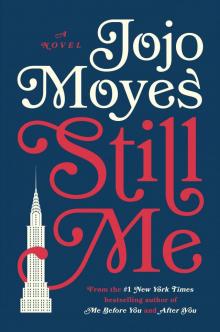 Still Me
Still Me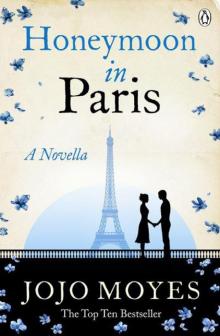 Honeymoon in Paris
Honeymoon in Paris Night Music
Night Music The Girl You Left Behind
The Girl You Left Behind Windfallen
Windfallen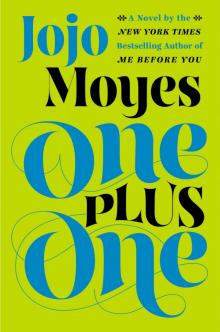 One Plus One
One Plus One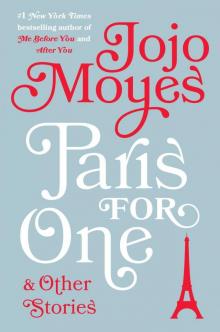 Paris for One and Other Stories
Paris for One and Other Stories The Giver of Stars
The Giver of Stars The Ship of Brides
The Ship of Brides The Peacock Emporium
The Peacock Emporium Silver Bay
Silver Bay The Horse Dancer
The Horse Dancer Peacock Emporium
Peacock Emporium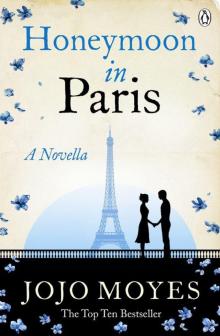 Honeymoon in Paris: A Novella
Honeymoon in Paris: A Novella Ship of Brides
Ship of Brides Paris For One (Quick Reads)
Paris For One (Quick Reads)